 December 2022 in “Scientific Reports”
December 2022 in “Scientific Reports” Stem cells from whiskers can be transplanted to stimulate hair growth.
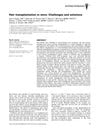 3 citations,
April 2016 in “Wound Repair and Regeneration”
3 citations,
April 2016 in “Wound Repair and Regeneration” Researchers successfully transplanted hair follicles in mice, which survived well and helped in wound healing.
 48 citations,
December 2004 in “Differentiation”
48 citations,
December 2004 in “Differentiation” Tooth papilla cells can help regenerate hair follicles and grow hair.
 194 citations,
May 2000 in “Journal of Investigative Dermatology”
194 citations,
May 2000 in “Journal of Investigative Dermatology” The hedgehog signaling pathway is crucial for hair growth but not for the initial creation of hair follicles.
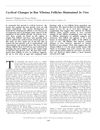 34 citations,
December 2000 in “The journal of investigative dermatology/Journal of investigative dermatology”
34 citations,
December 2000 in “The journal of investigative dermatology/Journal of investigative dermatology” Rat vibrissa follicles are useful for studying hair growth cycles, especially the transition from pro-anagen to anagen.
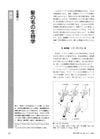 January 1998 in “KAGAKU TO SEIBUTSU”
January 1998 in “KAGAKU TO SEIBUTSU” The document suggests that male hormones likely affect hair growth and baldness, and future treatments might involve stem cells and androgen-independent cells.
 87 citations,
March 2005 in “Journal of Dermatological Science”
87 citations,
March 2005 in “Journal of Dermatological Science” Asiasari radix extract promotes hair growth and increases protein synthesis and cell proliferation.
 19 citations,
July 1993 in “The journal of investigative dermatology/Journal of investigative dermatology”
19 citations,
July 1993 in “The journal of investigative dermatology/Journal of investigative dermatology” Dermal-epidermal interactions are crucial for hair growth and maintenance.
Transplanted rat hair follicles grew hair and had increased but not fully restored nerve connections in mice.
 33 citations,
February 1999 in “The journal of investigative dermatology/Journal of investigative dermatology”
33 citations,
February 1999 in “The journal of investigative dermatology/Journal of investigative dermatology” IGF-1 increases whisker growth in transgenic mice.
 39 citations,
April 1992 in “Development”
39 citations,
April 1992 in “Development” Both cell and non-cell parts are important for rat whisker follicle regrowth.
 102 citations,
February 2008 in “The FASEB Journal”
102 citations,
February 2008 in “The FASEB Journal” One minoxidil-sensitive potassium channel exists in human hair follicles.
 86 citations,
June 2017 in “Stem cell investigation”
86 citations,
June 2017 in “Stem cell investigation” Stem cells from hair follicles can safely treat hair loss.
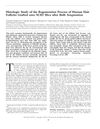 19 citations,
November 2001 in “Journal of Investigative Dermatology Symposium Proceedings”
19 citations,
November 2001 in “Journal of Investigative Dermatology Symposium Proceedings” Human hair follicles can regenerate and recover after severe injury by going through a brief abnormal resting phase before growing again.
 17 citations,
December 2010 in “Journal of Investigative Dermatology”
17 citations,
December 2010 in “Journal of Investigative Dermatology” Flightless I protein affects hair growth, with low levels delaying it and high levels increasing hair length in rodents.
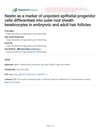 June 2022 in “Research Square (Research Square)”
June 2022 in “Research Square (Research Square)” Nestin-expressing cells turn into a specific type of skin cell in hair follicles during development and in adults.
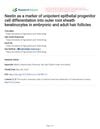 May 2022 in “Research Square (Research Square)”
May 2022 in “Research Square (Research Square)” Nestin marks cells that can become a specific type of skin cell in hair follicles of both developing and adult mice.
 94 citations,
February 1994 in “The journal of investigative dermatology/Journal of investigative dermatology”
94 citations,
February 1994 in “The journal of investigative dermatology/Journal of investigative dermatology” EGF makes hair follicles grow longer but stops hair production.
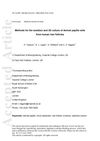 55 citations,
April 2017 in “Experimental Dermatology”
55 citations,
April 2017 in “Experimental Dermatology” The document describes a way to isolate and grow human hair follicle cells in 3D to help study hair growth.
 16 citations,
December 2006 in “Expert Review of Dermatology”
16 citations,
December 2006 in “Expert Review of Dermatology” Hair follicles are essential for skin health, aiding in hair growth, wound healing, and immune function.
 205 citations,
April 2005 in “Journal of Investigative Dermatology”
205 citations,
April 2005 in “Journal of Investigative Dermatology” Scientists have found a way to create hair follicles from skin cells of newborn mice, which can grow and cycle naturally when injected into adult mouse skin.
 182 citations,
December 2007 in “BJCP. British journal of clinical pharmacology/British journal of clinical pharmacology”
182 citations,
December 2007 in “BJCP. British journal of clinical pharmacology/British journal of clinical pharmacology” Hair follicles significantly increase the speed and amount of caffeine absorbed through the skin.
 78 citations,
August 2002 in “Experimental Dermatology”
78 citations,
August 2002 in “Experimental Dermatology” Researchers developed a quick and easy way to get and grow cells from the base of human hair follicles.
 11 citations,
January 2018 in “Acta dermato-venereologica”
11 citations,
January 2018 in “Acta dermato-venereologica” Researchers found specific genes in the part of hair follicles that could help treat hair disorders.
 7 citations,
January 2013 in “BioMed research international”
7 citations,
January 2013 in “BioMed research international” Hair follicles and deer antlers regenerate similarly through stem cells and are influenced by hormones and growth factors.
 6 citations,
November 2010 in “Histochemistry and cell biology”
6 citations,
November 2010 in “Histochemistry and cell biology” The proteins transthyretin and megalin are more present in the growth phase of hair, suggesting they might affect hair health and growth.
 45 citations,
December 1991 in “Annals of the New York Academy of Sciences”
45 citations,
December 1991 in “Annals of the New York Academy of Sciences” ECM molecules are crucial for hair growth and development.
 14 citations,
April 2000 in “Animal Science/Animal science”
14 citations,
April 2000 in “Animal Science/Animal science” Nutrients like vitamins, copper, zinc, and amino acids are crucial for healthy hair and wool growth.
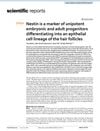 1 citations,
October 2022 in “Scientific reports”
1 citations,
October 2022 in “Scientific reports” Nestin identifies specific progenitor cells in hair follicles that can become outer root sheath cells.
 35 citations,
March 2005 in “Journal of Investigative Dermatology”
35 citations,
March 2005 in “Journal of Investigative Dermatology” Potassium channel openers like minoxidil help hair grow by acting on hair follicles.





























